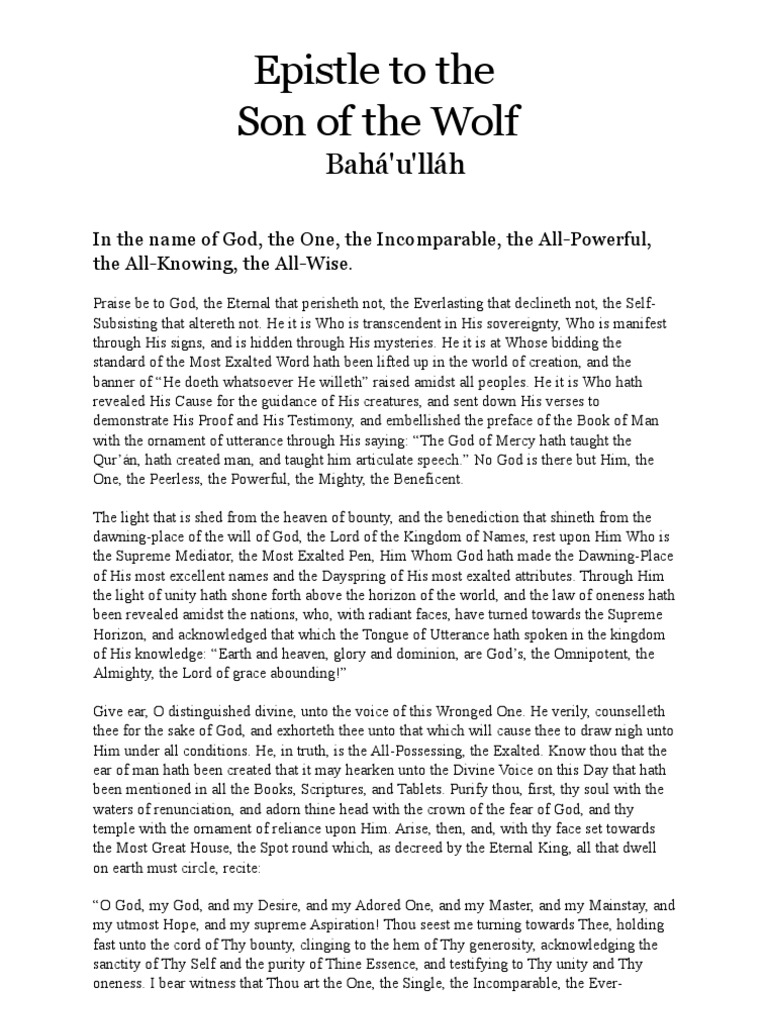In the realm of spiritual literature, few texts resonate with the profundity and depth of Bahá’u’lláh’s “Epistle to the Son of the Wolf.” This seminal work, conceived within the context of hardship and adversity, extends an invitation not merely to read but to engage with its profound insights and unparalleled wisdom. As followers of the Bahá’í Faith seek to navigate the complexities of contemporary existence, the “Epistle” serves as an essential guide, fostering a transformative approach to spirituality, community, and individual reflection.
At its core, the “Epistle to the Son of the Wolf” is a clarion call for unity and understanding. It is imperative to appreciate the epistolary form that Bahá’u’lláh employs; this modality not only personalizes the message but also engenders a sense of intimate dialogue between the author and addressee. The work was addressed to the notorious religious leader, Mirza Yahya (the Son of the Wolf), who had aligned himself against Bahá’u’lláh and his teachings. This correspondence emerges from a context fraught with tension yet offers, paradoxically, a perspective grounded in love, forgiveness, and the possibility of reconciliation.
From the inception of the text, one is struck by Bahá’u’lláh’s visionary prose. He articulates fundamental principles that reflect the essence of the Bahá’í Faith, emphasizing the oneness of humanity. This doctrine is not merely an abstract ideal but is rooted in actionable elements that call for the dismantling of prejudices—racial, religious, and nationalistic—that have historically fractured societies. Understanding these dynamics is imperative as nearly every reader confronts the echoes of such divisions in contemporary society. By challenging these entrenched notions, Bahá’u’lláh compels us to reevaluate our perspectives, urging us to transcend the confines of narrow identity and embrace a broader spectrum of humanity.
The intricate layers of the “Epistle” unfold to reveal themes that are simultaneously timeless and urgently relevant. Central to its narrative is the idea of progressive revelation—the belief that spiritual truths are revealed progressively by God through a succession of prophets and manifestations. This concept encourages believers to embrace a dynamic understanding of faith, one that is adaptable to the exigencies of our times. Consequently, Bahá’u’lláh’s teachings invite followers to ponder the implications of their own spiritual journey: Are we receptive to new understandings, or do we cling to archaic interpretations of doctrine? Such introspection not only heightens one’s spiritual awareness but also engenders a spirit of inquiry that is indispensable for personal growth.
Moreover, the “Epistle” does not shy away from the conundrums faced by humanity. Bahá’u’lláh poignantly addresses the realities of suffering, injustice, and the disillusionment pervasive in human society. His acknowledgment of these struggles underscores the importance of empathy and solidarity. In advocating for a shift from despair to hope, Bahá’u’lláh lays a foundation for resilience, illustrating how spiritual principles may be harnessed to counteract the tribulations of existence. The ability to perceive challenges through the lens of growth transforms adversity into an opportunity for learning and development, resonating with the concept of life as a school for the soul.
As one delves deeper into the philosophical implications of the “Epistle,” the interplay of justice and mercy emerges as a salient theme. Bahá’u’lláh delineates the necessity of balancing these two attributes, particularly in governing both personal relationships and societal structures. He challenges us to recalibrate our moral compass, advocating for a justice that is swathed in compassion. This holistic approach to justice compels individuals to contribute positively to their communities, ensuring that actions stem from a place of ethical integrity. In a world often marred by inequity, the teachings of the “Epistle” become a beacon of hope, guiding individuals towards the establishment of just and equitable societies.
Furthermore, the “Epistle to the Son of the Wolf” actively promotes the concept of consultation—a democratic process rooted in the values of teamwork and collaboration. Bahá’u’lláh encourages an ethos where diverse opinions can coexist, promoting a culture of respectful dialogue that leads to actionable insights. This principle is of utmost importance in today’s polarized climate, where listening and understanding seemingly stand in stark contrast to the prevailing discourse. Engaging with Bahá’u’lláh’s vision for consultation invigorates community dynamics, fostering a sense of belonging and common purpose that transcends individual aspirations.
Finally, the “Epistle” culminates in a profound exploration of the relationship between the divine and humanity. Bahá’u’lláh elucidates the innate potential within each person, advocating for an introspective journey that invites individuals to awaken to their divine nature. This theme of personal development echoes throughout the text, serving as a reminder of the importance of spiritual education. The goal is not merely to identify one’s beliefs but to transform them into lived experiences that reflect the teachings of Bahá’u’lláh.
In summary, Bahá’u’lláh’s “Epistle to the Son of the Wolf” is an extraordinary compendium of insights that beckons individuals to reevaluate their beliefs and behaviors in a rapidly evolving world. Through its multilayered discourse on unity, justice, consultation, and personal growth, the text inspires a renaissance of thought and action. It serves not only as a spiritual guide but as a catalyst for a profound, collective awakening—an invitation to transcend individualistic paradigms and engage wholeheartedly in the symbiotic tapestry of humanity.
